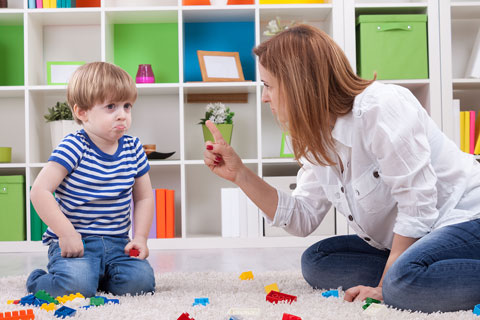Here are some words to use when you want to change your child’s behavior without yelling, spanking, or being angry.
Show that you understand why he wants to do what you don’t want him to do.
“I know that you want to stay on the playground longer, but…” or “I know that you want me to buy candy for you, but…” You can say no to an action without shaming the child for his reasons.
Give a brief reason why you can’t do what she wants you to do.
Be honest, but let her know you are fair and in charge. “It will be time for dinner soon, and I need to be home to get it ready.” “Candy may hurt your teeth.”
Offer a solution or an alternative.
Even if you believe she knows better, you can remind her. Try saying, “Sand is not to be thrown. Try letting it trickle through your fingers, or put it into the cup,” or “Don’t hit people. Tell me in words if you’re angry, or hit your punching toy.”
Remind her that there are other choices.
You can say, “Would you like to pick out a pack of sugarless gum or an apple instead?” or “We can’t stay now, but we can come back tomorrow.” Be consistent in following through on these choices.
Let your child know that you believe in his ability to do the right thing.
Speak respectfully (in tone and word) to your child. Consider saying, “I know how you like to help,” instead of saying, “Don’t bother me.” Instead of saying, “You always forget to wait your turn,” try saying, “I know you’ll remember to wait your turn next time.”
Set firm limits and rules children can understand.
Use a firm, kind voice, and keep directions short. You may need to repeat rules and directions until your child remembers for himself. “You may not watch that television program. You may turn it off, or I will do it.” “When you put your shoes on, we will go outside.” “Yes, I know you’re eager to go, but the car will not start until you are in your car seat.”
Share as many happy times together as possible.
Let him know you enjoy being with him. Laugh, play, hug, and cuddle your child. Compliment good efforts even if the result isn’t perfect. Talk with and read to her. Doing these things lets children know that they are important to you and encourages them to want to please you.
It takes time, readiness, and practice for children to learn to follow rules just as it does for them to learn physical skills, such as walking, or social skills, such as sharing. Learn more about typical behavior for your child’s age. Try to let them know that you are the leader and that you are there to help them grow.
Adapted from Positive Discipline. (1990). ERIC Digest. Champaign, IL: ERIC Clearinghouse on Elementary and Early Childhood Education.


 PDF
PDF